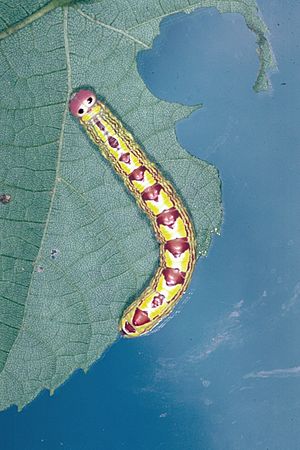Linden prominent moth facts for kids
Quick facts for kids Linden prominent moth |
|
|---|---|
 |
|
| larvae | |
| Scientific classification | |
| Kingdom: | |
| Phylum: | |
| Class: | |
| Order: | |
| Family: |
Notodontidae
|
| Subfamily: |
Notodontinae
|
| Genus: |
Ellida
|
| Species: |
E. caniplaga
|
| Binomial name | |
| Ellida caniplaga (Walker, 1856)
|
|
| Synonyms | |
|
|
The Linden Prominent Moth (scientific name: Ellida caniplaga) is a fascinating type of moth. It belongs to the Notodontidae family. These moths are found in many parts of North America. You can spot them from Texas all the way up to New Brunswick in Canada. They also live west to Ontario and Minnesota.
Contents
What Does the Linden Prominent Moth Look Like?
These moths are medium-sized. Their wingspan is usually between 34 and 44 millimeters. That's about 1.3 to 1.7 inches wide. Adult moths can be seen flying from April to September. In warmer southern areas, there can be two groups of moths born each year.
Life Cycle of the Moth
The Linden Prominent Moth goes through several stages in its life. Like all moths, it starts as an egg. Then it hatches into a larva, which is a caterpillar.
What Do Larvae Eat?
The larvae of the Linden Prominent Moth love to eat leaves. They especially enjoy the leaves of Tilia species, also known as linden or basswood trees. These caterpillars often feed high up in the tree branches.
Larvae Appearance
It's interesting that these larvae can look very different from each other. Their colors can vary a lot. This helps them blend in with their surroundings.
How They Survive Winter
When winter comes, the moths are in their pupa stage. A pupa is like a cocoon for a moth. They spend the cold months hidden in the soil. This helps them stay safe until spring arrives. Then, they change into adult moths and the cycle begins again.

